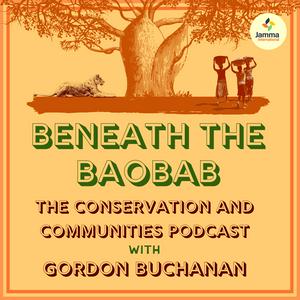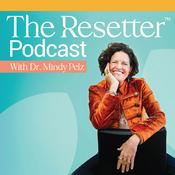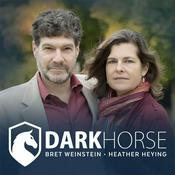24 episodes
- In this special episode of Beneath The Baobab, Gordon Buchanan brings together powerful stories from across southern Africa, exploring the challenges and solutions of human-wildlife coexistence.
From reintroducing species to managing livestock protection, addressing water scarcity to balancing tourism and trophy hunting, this episode dives deep into the complexities faced by communities living alongside wildlife. You'll hear tales of resilience and innovation, as well as insights into Jamma International’s collaborative approach to creating positive outcomes for both people and nature.
While some stories reveal heartbreaking realities, others highlight reasons for optimism and hope. By combining the lived experiences of those on the frontlines with expert perspectives, this episode offers a comprehensive look at how we can build a future of coexistence between people and wildlife
Visit the website https://jammainternational.com to explore more international projects.
An accompanying video to this episode can be seen here: https://youtu.be/nSmsQitsI3Y
Hosted on Acast. See acast.com/privacy for more information. - In this final episode of the series, presenter Gordon Buchanan heads home to Scotland to see the work that the Beaver Trust is leading to “regenerate the beaver species to regenerate the landscape”.
The Beaver Trust is a charity working to restore animals to habitats where they thrived in the past, building climate resilient landscapes across the UK and we speak to Elliot McCandless from the charity. We also chat to Tom, a fifth-generation farmer on the land but with a very different role to his predecessors.
Our conversations take place, thousands of miles away from the baobab – but with similar ambitions, challenges and conflicts to navigate.
We spoke to both Elliot and Tom alongside the mud banks of a beaver lake, home to the second family of beavers that were brought to Tom’s land in February 2022. Translocation and reintroduction of the species in Scotland brings its own controversies with conservationists, farmers, government and local people holding different perspectives on the beaver population as we’ll explore in this episode.
Whilst this is the last episode of series 2, we will be publishing a special bonus edition of Beneath The Baobab in the coming weeks, bringing together all the key points and fascinating conversations from the last 9 programmes.
So please follow, like or subscribe to make sure you don’t miss it – and leave a written review if you’ve enjoyed the series; it’ll help more people join us in our global conversation, beneath the baobab.
Visit the website https://jammainternational.com to explore more international projects.
The video of this episode can be seen here: https://youtu.be/5FOfzoGgy48
https://beavertrust.org
https://beavertrust.org/nature-boost-in-perthshire-as-second-group-of-beavers-moved-to-argaty/
https://www.nature.scot
Hosted on Acast. See acast.com/privacy for more information. - In this episode, we travel to Zambia to investigate a different – and lesser known – wildlife conflict to the ones already explored in the series.
The hippo affects many lives, often tragically, and we meet local people with their own stories to tell; both of hippo attacks and injuries caused by elephants in the country.
The Luangwa Valley sees dramatic seasonal variations and with a dynamic river system, fertile soil and lush vegetation, it’s the perfect home for a wide variety of animals – leading to a co-existence situation that delivers both opportunities and challenges for humans living in the area.
In Lupande Game Management Area (GMA), increased human population has led to the expansion of human settlements into protected areas, constricting many species’ ranges and an increase in wildlife populations has resulted in wildlife straying out of protected areas and into crop and livestock areas.
Rodgers Lubilo is a conservation and rural development expert from Zambia. He has 25 years’ experience in community led conservation in Southern Africa - especially in Zambia, Namibia, Botswana, Mozambique and South Africa. He is a champion of community rights to benefit from conservation. He chairs the Zambian CBNRM Forum and the Community Leaders Network of Southern Africa - a leading voice for local communities and indigenous peoples in the region.
We also hear from Goodson, Tinde and Dennis; all of whom have personal, and often tragic, stories of living in conflict with hippos and elephants.
We speak to them all, beneath the baobab.
Visit the website https://jammainternational.com to explore more international projects.
The video of this episode can be seen here: https://youtu.be/DTS1eRjfVi8
https://www.lukusuziriver.com/index.php/zambia-luangwa-en
https://www.researchgate.net/figure/Location-of-Lupande-Game-Management-Area-GMA-in-eastern-Zambia-Adapted-from-17_fig1_263088085
https://www.communityleadersnetwork.org/team_member/rodgers-lubilo/
https://www.cajnewsafrica.com/2023/05/09/zambian-woman-survives-hippo-attack/
Hosted on Acast. See acast.com/privacy for more information. - Kasungu National Park forms part of the trans-frontier conservation area between Malawi and Zambia. The area used to have a thriving wildlife population but due to poaching, it was left depleted with the resident elephant population coming close to extinction.
A translocation plan, put in place by the Malawian government, IFAW and African Parks, has returned the elephants to the park. Despite a positive long-term vision, the short-term effects have resulted in a number of human deaths, animal predation and crop damage – and with the country’s economy being agriculture-focussed, this aspect of human wildlife conflict is a particular concern in Malawi.
Fences are also proving to be a contentious issue. An area being fully-fenced goes against the principles of landscape-scale conservation and prevents free movement but it does provide extra protection to local communities. The tensions are laid bare in this episode.
Malidadi Langa is an economist and retired public servant with extensive experience across decentralisation, rural development, natural resource management governance and public policy – and community based natural resource management, otherwise known as CBNRM. He’s currently Chairman of the Board of Trustees for the KAWICCODA community association, represents Malawi CBNRM associations in the Southern Africa Community Leaders Network, advocating for community rights around sustainable use and benefit sharing.
Senior Chief Lukwe describes a highly populated country in comparison to its neighbours, the need for civic education of the risks from wildlife, and the importance of compensation for victims of human wildlife conflict.
Catherine Chunga is education and extension officer at the Department of Parks and Wildlife, Leonard Moyo is Education Division Manager and Ndaona Kumanga is National Park Manager at Kasungu. They describe Malawi’s unique relationship with wildlife, the challenges the local communities face, and what they are doing in their roles to manage and resolve human wildlife conflict.
We speak to them all, beneath the baobab.
Visit the website https://jammainternational.com to explore more international projects.
The video of this episode can be seen here: https://youtu.be/YCNrvMNfGQ0
Elephant Conservation in the Context of High Human-Wildlife Conflict | African Parks
ifaw's response to elephant tragedies in Malawi
https://www.voanews.com/a/villagers-in-central-malawi-face-attacks-from-elephants-/7280441.html
https://www.malawitourism.com/regions/central-malawi/kasungu-national-park/
Hosted on Acast. See acast.com/privacy for more information. - In this episode, we meet the Chizvirizvi community in Zimbabwe – a latecomer to the CAMPFIRE programme, compared to the Mahenye featured in episode 5.
Chizvirizvi is somewhat different as it’s not operated by the Rural District Council. Instead, authority for the utilisation and management of wildlife has been conferred to the community or collective resettlement scheme plot holders. And with the authority only designated in 2003, their CAMPFIRE programme is relatively in its infancy, with the infrastructure only just beginning to grow.
A survey in 2013 discovered the 77% of the population said they had experienced human wildlife conflict between the year 2000 and 2010. With this background, we expected a very different conversation to the one we had at the Jamanda Conservancy but as we’ve found throughout this series, there are always surprising – and often uplifting – stories to hear.
We start with a shocking story of bravery in the face of a crocodile attack from Morina and her son Gideon. Thankfully, the story ends well.
Mr Chirhilele is a farmer and rancher and describes how scouts and monitors go some way to protecting residents’ cattle but could do more. He asks that the wildlife population be maintained at an optimal number to ensure coexistence for him and his family, and for future generations.
Dr Shylock Muyengwa is Managing Consultant at the Centre for Impact Evaluation and President of the Zimbabwe Evaluation Association and since 2007, has studied community-based natural resource management systems (CBNRM). Kevin Mfishani is a member of Community Leader’s Network and a project officer with the Zimbabwe CAMPFIRE association.
They discuss the past, present and future of life alongside wild animals and the importance of empowering communities to make decisions and revenue, utilising their natural resources.
We speak to them all, beneath the baobab.
Visit the website https://jammainternational.com to explore more international projects.
The video of this episode can be seen here: https://youtu.be/-0fYvwrhQoo
https://www.researchgate.net/figure/Chizvirizvi-resettlement-area-Chigonda-2017_fig1_328048741
https://twitter.com/forevaluation?lang=en
https://www.communityleadersnetwork.org
https://campfirezimbabwe.org
Hosted on Acast. See acast.com/privacy for more information.
More Science podcasts
Trending Science podcasts
About Beneath the Baobab
Beneath the Baobab, the Conservation and Communities Podcast with Gordon Buchanan.Right now, up to 1 eighth of the world’s species are at risk of extinction and its down to us to act now, or lose them forever.In Beneath the Baobab from Jamma International, wildlife filmmaker Gordon Buchanan hosts cutting-edge conversations about conservation work led by communities around the world.Gordon hears from people living and working alongside wildlife; from elephants to lions, rhinos, wild dogs and endangered plants. In every episode Gordon hears from a unique project that’s seen marginalised community voices brought to the forefront of conservation, with inspiring and empowering stories to tell.The global conservation movement has never been more urgent in the face of climate change and mass extinction. But there is still much to be learned, and finally the voices, insights and experiences of indigenous peoples are being heard on the international stage.The places where wildlife and humans touch are not idealistic, harmonious locations, but often have raw edges, blurred boundaries and are fraught with conflict and competition. Furthermore, the external pressures imposed to protect wildlife don’t always support the people whose shoulders this change rests upon.That’s why we’re looking at examples and hearing from people working and living directly with and within those communities. In this series learn about Community Based Natural Resources Management, hear from indigenous peoples who are exercising their rights to do innovative work as custodians of resources for generations, then find out how they’ve developed work schemes, governance and management systems that allow them to place a high value on wildlife and build the economic case for conservation.The future for wildlife and endangered species can be positive, if we are all prepared to listen. Join Gordon and his guests Beneath the Baobab for stories of hope as well as brilliant, radical and innovative ideas for solving the problems faced by humans and wildlife. Hosted on Acast. See acast.com/privacy for more information.
Podcast websiteListen to Beneath the Baobab, StarTalk Radio and many other podcasts from around the world with the radio.net app

Get the free radio.net app
- Stations and podcasts to bookmark
- Stream via Wi-Fi or Bluetooth
- Supports Carplay & Android Auto
- Many other app features
Get the free radio.net app
- Stations and podcasts to bookmark
- Stream via Wi-Fi or Bluetooth
- Supports Carplay & Android Auto
- Many other app features


Beneath the Baobab
Scan code,
download the app,
start listening.
download the app,
start listening.








































